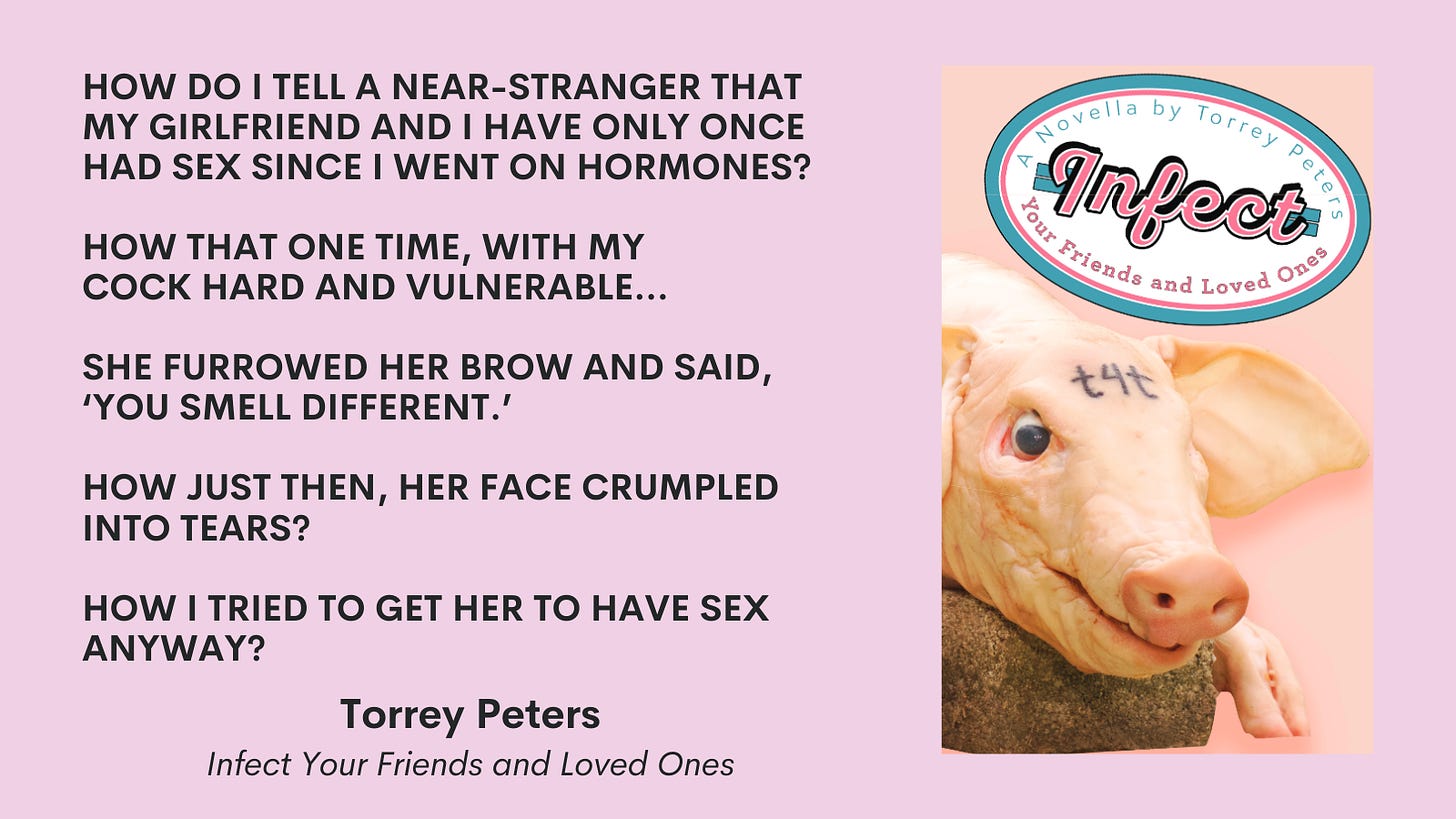The Women’s Prize for Fiction, one of the UK’s most prestigious literary awards, has released its longlisted nominees. Among them is a man, Torrey Peters, who identifies as transgender and who promotes ideas about womanhood that are steeped in pornography and BDSM culture. Peters, an American writer, received the nomination for his debut novel, Detransition Baby, which follows the story of Reese, a trans-identifying man who longs to be a mother, and whose ex (also male), Ames, provides him this opportunity when he unintentionally impregnates a woman named Katrina. From there, it falls upon Ames and Reese to convince Katrina “to split her unborn child with a transsexual.” When pleading his case to Katrina, Reese says, “Women who never have kids get treated like silly whores. I think that without a child, I’ll forever be a silly whore.”
Detransition, Baby is riddled with misogyny from start to finish. It is an inherent flaw; its main tenets are constructed from the flattening of women’s humanity. The problem is not cherry-picking, as feminists are so often accused of doing, but of an overabundance of examples. Within the first few pages the protagonist, Reese, is introduced to the reader while engaging in an impregnation fetish with a man who is HIV positive.
The risk, the thrill, that they might get pregnant—a single fuck to fuck up (or bless?) their lives. For cis women, Reese imagined, sex was a game played at the precipice of a cliff. But until her cowboy, she hadn’t ever had the pleasure of that particular danger. Only now, with his HIV, had she found an analogue to a cis woman’s life changer. Her cowboy could fuck her and mark her forever. He could fuck her and end her. His cock could obliterate her.
When discussing ‘bottom surgery’, a euphemism for surgical penile inversion
“I’ve worked to get comfortable with the idea that I have a penis, but that it’s a woman’s penis. I’m pretty much there, mentally. It helps that I grew up watching trans porn. I watched way more trans girls getting fucked than cis women, so I think I internalized the idea of trans women with cocks as the hottest, most feminine women out there.
When considering facial feminization surgery, Reese - the not-so-subtle alter ego of author Torrey Peters - ponders to himself:
“She would happily cheer on any other woman who flaunted her orbital ridge in the name of challenging cis-normative beauty standards, but she would have the first available misogynist dick of a surgeon burr her skull Barbie smooth.”
Peters offers up shallow platitudes as though they were spiritual discoveries: “It’s a mark of prudish inexperience to think that being fetishized and objectified isn’t the hottest thing going in the bedroom,” and truly seems to believe he’s uncovered what it means to be a woman and is reporting back to the world: “Until she transitioned, until she met women into rape-play, she couldn’t actually think of a single argument to counter the undeniable orgasm-certified evidence of her unpardonable misogyny."
Notably, Peters’ main character uses pornography to rationalize his desire to be a woman. He mentions autogynephilia, a medically-recognized paraphilic disorder wherein men are aroused by the thought of themselves as women, not to dismiss the idea but to claim that everyone, to some degree, is an autogynephile:
“‘Autogynephilia’ only works if you don’t think trans women are women. If you do, then you immediately see that the majority of women, cis or trans, are all autogynephiles, and that most men would be autoandrophiles—it’s not something special about trans women. Of course women are turned on by being women and men turned on by being men! Watch any porn and the sexuality of everyone in it is actually about their own auto-andro/gyne-philia. Listen to them talk. It’s all about validating their own gender. Oh yeah, I’m your little slut…yeah, baby, you like this big cock? And alone on their laptops somewhere: the viewers, turned on to identify with people identifying with their gender.”
Pornography and the fetishization of the female experience are recurring themes throughout Peters’ works, including the transgender porn genres of forced feminization and sissification. Peters’ first novella, The Masker, revolves around a crossdresser who attends a masking convention in Las Vegas. ‘Masking’ refers to a male fetishists who don silicone masks or full body suits to resemble women and subsequently engage in sex acts while pretending to be female.
“He reminds me of pictures I’ve taken of myself alone, in outfits that speak to some deep archetypal part of me—my body hidden in ruffles, my hard cock peeping out, my eyes dilated from the pleasure of it. Pink fog, crossdressers call it—the distorting euphoria of dressing, of finally giving in.”
The basic premise of The Masker is this: a crossdressing man becomes disenchanted with the fetish scene, and in particular, with an older trans-identifying male “only recently on hormones.” Initially the protagonist expresses doubt and seems aware of the sexual element involved:“I don’t know if I’m a man, but I just don’t really believe I’m a woman—I’m obsessive with my fetishes, about certain clothes, in ways I’ve never seen in women. I’ve never heard a girl talk about getting wet putting on a new dress.”
In another instance, Peters’ seems to be suggesting that violence against women has a feminizing effect, and is therefore an instrument of sexual validation in a man’s paraphilia for being treated ‘as a woman’:
"He slapped me as I had seen women slapped in movies… he could treat me as a vulnerable woman... The thought turned me on. His slap had been the most feminizing thing that had ever happened to me, the most pure forced feminization of my life."
The Masker does not assert that MTF transgender identity is separate from paraphilias, but that such sexual proclivities are essential to the process of identifying as a woman, and the main distinction is whether or not one is willing to commit full-time:
"Why can’t I just let my crossdressing be a fetish?
Why does my particular fetish have to take such precedence that I change my whole life, my whole body, just to accord with it?"
Peters’ second novella, Infect Your Friends and Loved Ones, is about a transwoman who unleashes a virus which forces everyone to take hormones in order to survive after being rejected by his girlfriend.
“How do I tell a near-stranger that my girlfriend and I have only once had sex since I went on hormones? How that one time, with my cock hard and vulnerable... she furrowed her brow and said disconsolately, ‘You smell different.’ How just then, her face crumpled into tears? How I tried to get her to have sex anyway?”The undercurrent of rape culture continues in another scene at a “queer bar,” where Peters describes a lesbian woman bragging about her “gold-star” status (used to refer to lesbians who have never been intimate with a man) and denounces this as transphobia.
“Once in a queer bar, I heard a cute woman in a leather motorcycle jacket joke about her gold star status—she’d never once touched a penis. My friend Zoe had been drinking G & Ts for an hour before that, working up the nerve to ask this woman out. I found Zoe fifteen minutes later, outside the bar, soaked from hiding in someone’s dew-covered hedge on 15th, where she had cried softly in frustration. ‘Yeah, that’s transphobia,’ my crush agrees.”
There is also an undercurrent of narcissism and self-importance in all of Peters’ works. Indeed, the common overarching message of Peters’ stories, whether in his earlier novellas The Masker and Infect Your Friends and Loved Ones, or in Detransition, Baby, appears to be that men who fetishize women should be allowed to have whatever they like, to define women however they see fit, and that they are entitled to prioritize their feelings, sexual or otherwise, over women’s reality.
Feminists who oppose gender ideology frequently express concern that women are being reduced to harmful stereotypes. Yet it seems it’s much worse than that: women as a class are being reduced to pornography. The views of women put forward by Torrey Peters do not exist in a vacuum; they are intrinsic to the gender movement, and could explain a surge in young girls seeking medical transition. Men who appropriate women’s identity are telling women that we are defined by what men do to us, by sexual submissiveness, and by how willing we are to internalize our objectification. Young girls, upon hearing that message, might understandably want to escape this definition of womanhood. By nominating a man who romanticizes violence against women, endorses plastic surgery to look like a ‘Barbie,’ and callously implies that women are defined by how well they perform restrictive gender stereotypes, the Women’s Prize has delivered a serious and damaging insult to women and girls.
Despite being called a “critically-acclaimed” debut novel in a self-referential ploy by The Guardian, the praise showered on Detransition, Baby, along with the pseudo-celebrity status of Peters, seems to have been constructed in part by at least three other men with paraphilias and access to large media platforms. Among them is Grace Lavery, who penned a review for The Guardian in January. Lavery teaches at UC Berkeley and includes among his curriculum “sissy hypnosis” porn and has said, “undisguised sexism possesses an exhilarating vitality.” Emily VanDerWerff, critic and writer for Vox, also provided a glowing review for Peters, and has claimed that all ‘gender feelings’ are synonymous with sexual arousal. In addition, Peters has, in the past, received a promotional review from Harron Walker, who has advocated in favor of forced feminization paraphilias. Lila Shapiro, writing for Vulture, has published only two articles for the site: a review of Detransition, Baby, and of another book that Shapiro describes as containing “sex scenes that are depraved, explicit, and fantastical.”
I have requested an explanation for this decision several times on Twitter and have not yet seen a response. Moreover, information about the board of trustees for the Women’s Prize has been pulled from their website. I would like to again request a public statement from the board regarding their nomination of Torrey Peters for a prize reserved for women, the class of people who have been excluded from society for centuries on the basis of sex, who reduces us all to even less than a sex object -- to acts of sex, to a “fantasy of sexual powerlessness.” I would like a reply from the Chair of the Women’s Prize, Bernadine Evaristo, informing the public of whose decision this was and what motivated their thinking. I would like the Women’s Prize to acknowledge this offense and to replace Peters with an up-and-coming woman author who is more suitable for the honor.












To those asking where they can complain, here is the board https://www.womensprizeforfiction.co.uk/about/the-board
Politics and gross misogyny aside, the writing is absolute dross. If the judges believe this is worthy of the shortlist I question their basic ability to separate good writing from bad writing.